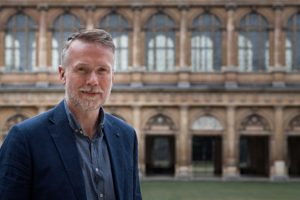Telling our Success Stories
Four part Q&A with Richard Turnill, Senior Bursar, Trinity College Cambridge
1. Trinity College founded the first science park in Europe, Cambridge Science Park, providing land and funding for hi-tech enterprises in the region. 50 years on, over 100 world-changing companies occupy the Park, pioneering R&D in everything from disease prevention and robotics to renewable energy generation.
How important is it for universities and colleges like Trinity to be involved in incubating and supporting innovation across the Oxford-Cambridge Arc?
At the heart of all university and academic institutions is a desire to push forward original thought. For Trinity specifically, our mission is education and research for the public good. Advancing R&D and driving innovation will always be part of this; investment in scientific and technological progress helps us to maximise returns that further support Trinity’s activities, while at the same time encouraging future innovation that is emerging here and elsewhere.
The best example of how Trinity supports innovation is Cambridge Science Park as you’ve rightly pointed out. My predecessor Sir John Bradfield had enormous foresight to create the first science park in Europe; it’s remarkable to think the land – then of course only fields – was donated to the College by its founder Henry VIII in the sixteenth century.
The success of Cambridge Science Park has accelerated in recent years. Forty plus years ago Trinity took a very long-term view, and now the College and society at large benefit from the ground-breaking innovations companies at CSP have and continue to develop. Owlstone Medical introduced the world’s first breath biopsy test for the early detection of cancer, Excalibur Healthcare produced one of the first lateral flow and PCR health kits to detect COVID-19, and there is exciting work in fields like virtual reality.
Trinity was at the forefront of creating a fertile environment for this innovation. The College developed Cambridge Science Park as a key hub for innovation in the region and to catalyse exchanges between innovators and entrepreneurs with similar interests. It’s inspiring to see this model replicated in the region and beyond.
Of course, Cambridge Science Park is a focus of attention because of its history and success – and because we are continually developing it. But the College’s approach to innovation is broad based. In Felixstowe we helped to establish a joint venture between the port and the University of Cambridge to incorporate 5G IoT technologies. And across our securities portfolio, we identify and invest in innovative start-ups and emerging sectors.
There is a keen interest in making a real-world difference by supporting innovation that has positive impacts, yes in Cambridge and the East of England but also around the world.
2. What about innovation in the College itself? How does the environment created by Trinity support emerging start-ups and spinouts?
Across the College there are Fellows involved in successful real-world applications of their research, notably the former Master, Sir Gregory Winter, who developed of a new category of drug that revolutionized the pharmaceutical sector and changed many people’s lives worldwide. This culture of innovation and entrepreneurship helps show students and researchers that support can be provided as they look to develop their ideas and take them outside the University into the wider world.
Within Trinity, world-leading research that wins global prizes makes a big impact on current and prospective students. The College is fortunate to have 34 Nobel Laureates, mostly recently Professor Didier Queloz, for Physics, not to mention leading mathematicians and scientists such as Professor Greg Hannon and Professor Rebecca Fitzgerald, who are pioneering smart techniques to identify cancer and pre-cancerous conditions early on.
For students, the College provides an extraordinary networking environment to meet and discuss fresh ideas. Trinity brings together students and academics from different disciplines to collaborate, and supports innovation through awards such as the Trinity Bradfield Prize, which is open to teams across the University. As well as no-strings attached funding, researcher-entrepreneurs can access the Bradfield Centre’s fantastic networking and mentoring opportunities, as well as business support, all of which is crucial to developing the commercial viability of research-generated ideas.
3. How does Trinity benefit from being in close proximity to public and private enterprise from a research and collaboration perspective?
The key here is that we need to recognise a symbiotic relationship between the University and the innovation undertaken by public and private enterprise. Spinouts from Trinity and other Colleges in Cambridge come onto the Science Park we’ve developed, like Astex Pharmaceuticals developing drugs to combat diseases of the central nervous system and Cambridge Touch Technologies making super accurate sensors for electronic devices; their biggest talent pool is the University itself.
Those success stories then inspire a new generation of innovators with cutting-edge ideas, creating the ideal environment for further collaboration. That’s why we’ve worked hard to foster relationships with many organisations within Cambridge Science Park and the wider Arc region.
For Trinity, it works both ways. This is essential if we’re to understand why it’s so important to support scientific enterprise.
4. How can we continue to generate global interest in R&D activities within the region?
There are three ways to maximise global interest in R&D activities in Cambridge and the region more broadly.
First, we need to listen to students and businesses present in the region to understand what support they need to grow and scale. Trinity has done this well and we need to continue actively ensuring their needs are heard.
Second, both business and academia need to come together. The Bradfield Centre is an ideal forum for these sorts of exchanges that drive innovation and help catalyse commercial application.
Third, there needs to be organised collaboration. Collaboration isn’t only manifested in places like Cambridge Science Park but in many different ways, including prizes and programmes that channel capital to new ideas and our investment in innovative start-ups and emerging sectors.
We can do more by telling the success stories better: what is research and innovation for? What are the benefits of collaboration, locally and globally? R&D isn’t there just to make money and it’s not purely an academic exercise. It’s for the good of everybody, and what’s happening here has a positive impact worldwide.
If the Oxford-Cambridge Arc is going to be a primary European hub for innovation, we need to amplify this message.
Get in touch



